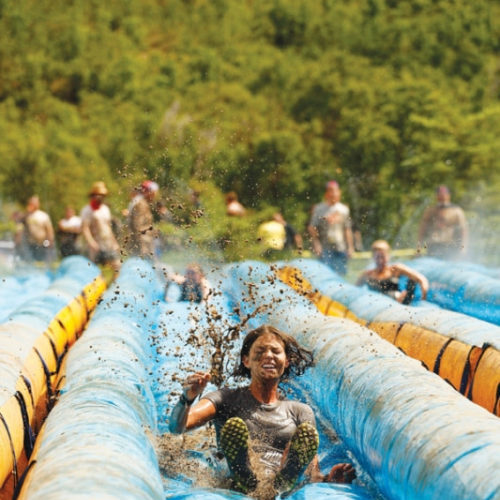
The Dirty Dash: A Gateway Drug to Running
Community
When most people think of running a 5k littered with swamps and walls of hay bales, the word “fun” may not be the first thing that springs to mind. Since the Dirty Dash started three years ago, however, every race they’ve held at Soldier Hollow in Midway has filled to capacity with runners eager to get sloppy—many clad in themed costumes. This year, each of their 10 races, from Albuquerque to Seattle, has sold out.
Despite their runaway success, Matt Ward, co-founder, sounds unusually casual about it all. “We’re the surfer dude of mud runs,” he says. The idea for the Dirty Dash came when Ward and John Malfatto, another of the founders, ran a similar race at Camp Pendleton, a Marine Corps base near San Diego. “We thought, ‘This is ridiculous and stupid, and Utah needs it.’ In a good way of course,” he says. “Utah’s uptight, and we thought it needed a mud run.” The Dirty Dash organizers don’t think that it’s just Utah culture that needs to lighten up, but also other races. “Mud runs have been around for 30 years,” Ward says. “There are the big players like Warrior Dash and Tough Mudder, but they market themselves like this super badass race with fire and horns and barbed wire and it’s Affliction-style: ‘Be a man, eat this huge hambone afterwards.’ We’re just like, ‘Come up here and hang out with your friends and have fun.’” The casual attitude isn’t just a marketing strategy; the company’s tone partly comes from the founders’ desires for a more relaxed, fun career. They all come from typically white-collar environments. “John worked for Ragnar, a pretty corporate company,” he says. “I worked in voice-over IP. I worked with spreadsheets and quotas. Our third partner, Scott Crandall, was in private equity. We wanted to make people happy for a living, and that’s really what we do.”
The founders are no slouches, though, when it comes to their own level of fitness. Malfatto swam competitively in college, and Ward is an ultra-runner, running 100-mile races. While they obviously see a place for more competitive activities, the Dirty Dash is decidedly not such a place. “Every now and again, we’ll get a random email of ‘I didn’t get a finisher medal’ or ‘I didn’t get my timing chip,’” Ward says. “That’s because it doesn’t exist. You have 51 other weekends out of the year where you can run competitively… This is the one weekend where you don’t bring those to our table. If people ask me, ‘How fast did I go?’ my response is a swift punch in the face, because we don’t care.”
Ward sees this as a way to appeal to those who don’t normally run, even calling the Dirty Dash the “gateway drug to running.” “Mostly we get people who want to have a good time, mostly people who want good pictures for Facebook,” he says. “I’m on the microphone for every race, and I ask ‘For how many of you is this your first 5k ever?’ By a show of hands, it’s roughly half,” he says. When asked if it’s satisfying to know that they’re bringing people out to do something active, Ward assents: “There has to be something that starts people. We get a lot of happiness from exercise and being outside, and the cool thing is that our business gives people that experience. Treadmills and gyms, stuff like that, sure, they make you look hot, but they’re not fun.”
Ward even makes putting on the race seem fun. He describes their signature obstacle, a custom, inflatable slip-and-slide with five lanes that is 30 feet wide and 150 feet long. “Once we saw how successful registration was going, we wanted to give back to the athletes, so we made this slip-and-slide.” They aren’t resting on their laurels when it comes to obstacles. “Every year, we add two or three more. We’re constantly trying to make it more fun,” he says. The newest obstacle this year is called the Mud Mine. “We got air compressors that are buried in the mud, and, as people run through it, it shoots mud into the air all over you,” he says. Despite the push for innovation, Ward’s favorite obstacle is a natural one. “At the Utah race, Deer Creek is by far my favorite obstacle because it’s knee-deep mud that sucks your shoes off. It’s soggy and gross. It’s stinky, beautiful mud. It’s virtually impossible to run through. It’s hard to recreate that anywhere else.”
While the Dirty Dash’s popularity continues to grow across the West, with new races planned for northern California and Colorado next year, the Utah races remain the most popular, with 7,500 participants racing twice a year. “There’s a chance for people to be dirty and not feel guilty about it,” he explains. “We actually did a BYU ad campaign last year that was like, ‘Get dirty and not have to talk to your bishop about it.’ We did that in the BYU paper.” Despite their mischief, Ward attributes part of their success to good relationships. “We have great relationships with running stores and gyms. How does the saying go, ‘Scratch my back, and I’ll throw mud in your face’?”



